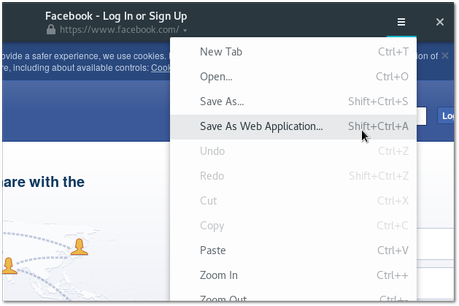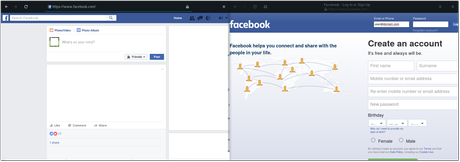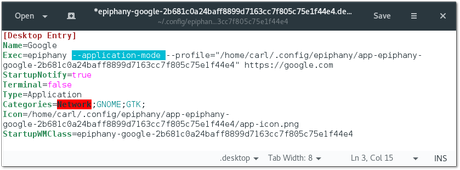Lessen sneaky Facebook & Google tracking with epiphany
03 July 2016
If you log into Facebook or Google and then access a website with a Facebook "Like" or a Google "+1" button, those services will be notified of the sites you visit, and that information will be used to target ads to you. Similarly, any Google searches you make while logged in (for those occasions when Duck Duck Go just doesn't cut it) will likely be linked to your account, regardless of your "Search History" setting.
Assuming that, like me, you're stuck using some of these services for the time being and, like me, you'd like to share as little of your life with them as possible, one solution is to use a separate browser (or a separate browser "profile") to keep cookies — and thus login state — separate.
A dedicated investigator on Facebook's or Google's end could probably still track you by a combination of web browser identification (your browser will usually report its exact version number, and your operating system, to sites you visit) and IP address — and sites will still use sneaky tricks to track you across multiple websites you visit — but this should sever the automatic link between your account and the advertising profile they're building up from browsing.
These instructions are for GNOME's web browser, "Epiphany" (because it's fantastic and under-appreciated..) but they can easily be applied to other browsers and, with a bit of thinking, other operating systems. Leave a note in the comments if you'd like tips on how to adapt this approach to your set-up.
Creating a Facebook "web application" in Epiphany
Facebook is a reasonable fit for Epiphany's "web application" mode because there's a single important URL, and rarely a need to open multiple tabs.
So, navigate to Facebook in Epiphany (you don't need to log in) and click "Save as Web Application" (or Ctrl+Shift+A):
Epiphany should pick up the site's icon, and ask you to confirm the name of the new app:
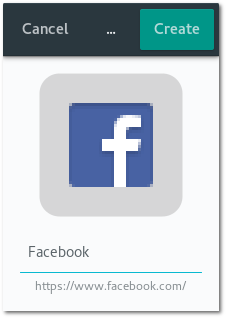
Click "Create" to save, and you'll see a notification that the app has been created and offering to launch it. You may have noticed that Epiphany chose a gnarly low-res version of the Facebook icon for some reason — to fix that, open a "Files" (nautilus) window, use Ctrl+L or click the address bar to turn it into a text entry field, and enter ~/.config/epiphany:
Open the directory with the name starting with app-epiphany-facebook, and replace app-icon.png with a better version of the logo, e.g. this one. (You'll need to restart GNOME Shell to pick up this change; the easiest way is Alt+F2, type r, press "Enter")
You should now have a "Facebook" app in GNOME:
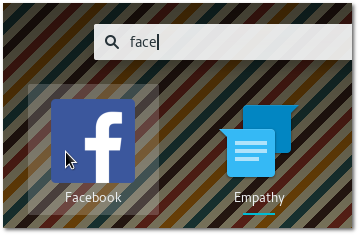
If you weren't logged in to Facebook when you started this process, you'll need to log in after launching the new app. If you were logged in to start with, make sure you visit Facebook one last time in your normal Epiphany to log out.
Now you should be able to verify that you're logged in in the app, but not your normal browser:
Finally, I would recommend deleting all of your Facebook cookies from your normal browser profile, to defeat any residual link they may allow Facebook to make between your browsing and your identity. To do so, open a Terminal (gnome-terminal) window, and type:
$ sqlite3 ~/.config/epiphany/cookies.sqlite
and, at the SQLite command line that then shows up,
sqlite) DELETE FROM moz_cookies WHERE host LIKE '%facebook.com%';
Using a separate browser profile for Google services
Google services can be a bit more complicated.
You could create a separate web app for each (e.g. Drive, Calendar, etc.), but Google will happily let you switch apps.. so it's relatively easy to end up with e.g. Calendar open in your Drive web app, making it tricky to find and switch to your windows. Also, Epiphany web apps (by design) don't support multiple tabs, so you're out of luck if you want to e.g. open a few documents in Drive in the same window, or have GMail and Calendar share one.
My solution is to use a separate Epiphany profile for all Google services; this means that I can do Google searches in my main profile without linking them to my Google account, while still being able to access Google services easily in my main browser.
You can set this up manually, but I just created a "Google" web app as for Facebook and then tweaked it to disable "web application" mode (and thus re-enable tabs). To do so, follow the steps above to create a web application on Google.com, then open ~/.config/epiphany/app-epiphany-google-... in Files as above. Replace app-logo.png if desired, then right-click the epiphany-google-....desktop file and open it with "Text editor" (gedit):
On the Exec= line, you should see --application-mode — delete that text (making sure to leave at least one space between the other arguments) and save.
Now, restart GNOME Shell as above (Alt+F2, r, Enter) and you should have a Google "application" as well:
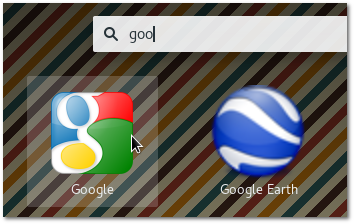
Again, as necessary, launch the app and log in to Google, or log out of Google in your normal browser. You should now be able to verify that you can access everything in the "Google" app while remaining logged-out for normal browsing.
Finally, I would also recommend deleting Google cookies from your normal Epiphany — use sqlite3 to load the file as above, then:
sqlite) DELETE FROM moz_cookies WHERE host LIKE '%google.com%';
Conclusions
Relying on profit-seeking entities for our communications infrastructure is dangerous. Apart from the industry-standard practice of tricking users into an incredibly bad deal (getting a far higher price for user data than what I suspect most users would pay for the "free" services), a private, opaque entity has little incentive to behave fairly to users (e.g. Violet Blue being locked out of her account, and having to show government-issued ID to regain access) and has immense, unchecked power to manipulate news and opinion.
In the mean-time, however, while there are still 1.65 billion people on Facebook and people — rightly or wrongly — feel that they risk social death to kick it, there's a lot that can be done to minimise how much intrusion these companies have into our lives, and how effectively they can learn about us for the purposes of hawking more useless shit.
Do you have any further tips on reducing on-line tracking? What about blocking Facebook and Google cookies altogether, or making Google Analytics respect your "Do Not Track" setting on all sites you visit? (Currently, website owners have to use a third-party script to achieve this.. and I can't imagine that many do)

